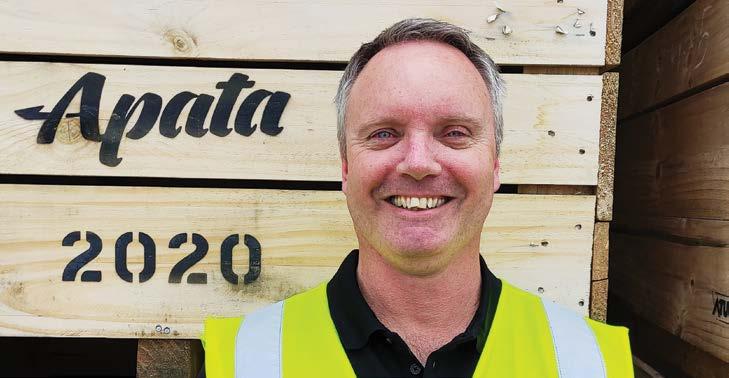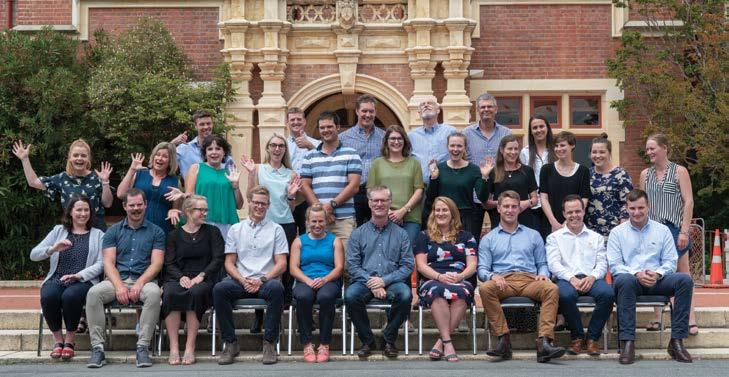
10 minute read
From helping people make travel plans to getting them into jobs


IT W OUL D BE STI N K I F THES E G O T I N T O N EW ZEALA N D



Jeffrey Benfell now helps people into jobs
From helping people make travel plans to getting them into jobs
Speaking from both sides of the table, Jeffrey Benfell shares how he pivoted from travel agent to human resources in the Bay of Plenty kiwifruit industry.
By Casey Vassallo
The primary industry has long provided careers for Kiwis, but it continued to show job stability amid Covid-19 in New Zealand. When jobs in other sectors were hard to come by, it opened its doors for people like Jeffrey Benfell.
After 20 years in the travel industry, Jeffrey was made redundant from YOU Travel in Bethlehem, Tauranga, just as the sector started feeling the ripple effects of the pandemic. Turning lemons into lemonade, Jeffrey made a call to a friend who introduced him to the team at Apata. He was promptly hired as a human resources assistant and started work on Monday 23 March 2020, just as the country headed into lockdown Alert Level 3.
“The kiwifruit industry has always been one of the mainstays of the Bay of Plenty area,” Jeffrey says. “I knew there would be at least seasonal work in a packhouse, and I was lucky that it's worked out to be more than seasonal.”
Located in Katikati and Te Puke, Apata Group Limited is one of the kiwifruit industry’s largest fully integrated postharvest operators. It provides both kiwifruit and avocado growers with their pack, coolstore and shipment facilities. Apata is a far cry from High Street, Kensington, in London where Jeffrey first got into the travel industry working for giant company Trailfinders in 1999.
It was in the United Kingdom he met his wife Jana from the Czech Republic, and they had their two children Nicholas (16) and Amy (14). Wanting a quieter lifestyle for their young family, they headed back to Jeffrey’s homeland in 2007, settling in Tauranga. Jeffrey continued to work as a travel agent in Bethlehem, which always required him to pay close attention to news reports across the world.
“I remember when the stories [about Covid-19] were first breaking in late October 2019, and I thought, this is going to be a lot worse than a lot of people are thinking,” Jeffrey says. “Once [Covid-19] started spreading, then going into North America and Europe, it looked like only a matter of time before it would hit Australia and then us in New Zealand.”
While a change of career and industry would scare most people, Jeffrey jumped right into the new role, which came at an opportune time. “[Before being made redundant], I was actually looking for a job that meant I wasn’t just achieving something, but I would be doing some good. Working in the kiwifruit industry has brought my feet back to the ground, and I appreciate just how lucky we are in New Zealand.” After spending the first couple of days in planning for the company to meet the government’s social distancing requirements, Apata was back up and running as an essential business.
“It was pretty chaotic, but it was managed chaos, and Apata made sure that everyone was looked after,” Jeffrey says of the family-friendly company. “They alleviated a lot of staff's fears and gave them the option to keep going or step aside.” As his role covers the full scope of human resources, from recruitment to attendance, Jeffrey was able to transfer many of the skills he’d learnt from his decades in customer service.
“In the travel industry, you have to wear so many different hats and be able to multitask. One person could be wanting to do something in Asia or Africa, and the next person could want a cruise around the Arctic, so you've got to be able to think quick,” he says. “That’s also a big thing in human resources – you've got to be able to think on your feet but take the time to give the right answer.” But it’s Jeffrey’s love of working with people that makes his new role the perfect fit. “If someone needs a job, or is struggling, we can look after them,” he explains. “There were a few people during the lockdown period who really did need to get into the kiwifruit industry [to support themselves], and we were able to welcome them with open arms.” From the orchard to the supermarket, kiwifruit requires a variety of skilled workers for its farm to plate journey. “Almost anyone can work in some capacity in kiwifruit,” Jeffrey explains. “For stackers, it's quite a physically demanding job. For graders, it's mentally focused. And for tray preparation and packers, it takes a lot of skill, thought and speed.” As Apata specialises in kiwifruit alongside avocados, it also provides sustainable job options in its post-harvest packhouse. “Because we have both, it keeps a lot of our people in very good employment for ten months of the year.” For Jeffrey, there’s plenty to love about his new job; from the genuine people at Apata to the fact he’s no longer sitting behind a desk for eight hours a day. Not to mention it involves learning something new every day about food production. “It's been in the Bay of Plenty for 40 years, but the growth is just incredible,” he says. “In New Zealand, we're fortunate to have our horticulture, viticulture, seafood and forestry. We've got a lot of roles that will be sustaining the country for a long, long time. You can put your stake in the ground, and you know you've got a long-term career if that’s what you’re looking for.”
Reaching all levy-paying fruit growers in New Zealand, in print and online.
If it’s fresh produce in New Zealand, we have it covered.
HORTICULTURE NEW ZEALAND
VOL 95 | NO 04 | AUGUST 2020
Covid-19 impact on kiwifruit industry
In this issue
14 Attracting the next generation 30 Co-operation key to coping with Covid-19 36 We pulled it off: harvesting through a pandemic
Online
$95 for 11 issues & $12 for one issue
New Zealand resident: NZ$125 (GST inclusive) Australia & Pacific: NZ$210 (airmail delivery) Rest of the World: NZ$220 or US equivalent (airmail)

The most recent Kellogg cohort who graduated in November 2020 at Lincoln University
Rural leaders: shaping the future of agribusiness
Bright minds seek knowledge and we’re lucky that here in New Zealand those bright young minds are popping up in all corners of the country.
By Heather Woods
But paving the future of the agribusiness sector is no easy task. You can’t simply train someone in a job and expect stellar results. And it’s certainly not a one-person job. Training is a great place to start, but to really drive change and see genuine benefits from the innovations of those bright minds, the best thing you can do – as an employer or an employee – is consider the mentoring, networking and development opportunities of a Rural Leaders programme.
The Kellogg Rural Leadership Programme and the Nuffield NZ Farming Scholarships activate, develop and accelerate leadership qualities. Both programmes are innovative, dynamic, and consistently refined in line with the current climate in the sector – like when a global pandemic strikes. They’re flexible and fluid programmes that are always open to new ways of planning and delivering content that benefits the entire agri-business sector.
Growing leadership talent and the entrepreneurial edge
A course is only as good as its leaders. Programme director Scott Champion and academic director Patrick Aldwell are at the controls and that means just one thing – a strong delivery. Scott brings exceptional leadership, strategy and solid facilitation, while Patrick (who has worked with the Kellogg Programme for the last 20 years) works side-byside with Nuffield Scholarship students helping them develop and refine their research projects. It also makes sense that high calibre speakers from the industry support the programme. People like Ian Proudfoot (global head of business, KPMG), David Nottage (professional trainer and speaker, TORQUE) and Rob Hoult from Team Leader, who is a driving force when it comes to leadership training and generates ringing endorsements for his guidance and teaching style.


Kellogg participants in residential training at Lincoln University Kellogg participants attending the Beehive on their residential phase in Wellington to understand ‘The Political and Economic Context for Leadership’
Alumni of these programmes graduate with a concentrated accumulation of learnings. Then once they start to pick strategies apart and digest the load, they acquire a growth mindset that allows them to step up and lead more effectively in their day job. And it is this that gives them the edge over their peers.
Collaboration for innovation
Those in the food and fibre sector will benefit most from the Kellogg Programme, where they will learn to understand themselves and identify their leadership style, including their strengths and weaknesses. Chris Parsons, chief executive for Rural Leaders says “the great thing about Kellogg is becoming part of a 1,000-strong, nationwide alumni of leaders. And as alumni, many go on to have significant influence in their community or sector.” But what also makes the Kellogg Programme a standout is the opportunity to collaborate in-person; a key part of the course is multiple intense residential sessions that foster connection. Covid-19 created obstacles in 2020 with travel and event restrictions but at the end of the day everyone, regardless of which side of the farm gate they’re on, had the opportunity to develop themselves and learn ways to support their communities and businesses.
The same can be said for the Nuffield Scholarship students. The Nuffield Scholarship is a prestigious programme that runs over 12 months and the experience helps students gain new, valuable insights and ideas to bring back to the New Zealand market, where they’re shared and implemented. And many of those insights positively influence the decisions that affect the entire agri-food sector and our rural communities, driving the industry forward and creating new opportunities, new jobs, utilising more advanced technology and using more sustainable methods to ease the impact on our environment. Usually 16 weeks of international travel enables complete immersion in global agricultural practices and the context in which they operate, but in 2020 Nuffield Scholarship students worked through a lessons collection activity; a role-defining knowledge quest to capture the insights of innovative and entrepreneurial businesses. And in true Kiwi-style, resilience shone through with students delivering a substantial, insightful report at the November 2020 awards ceremony. They didn’t let Covid-19 win.
A game-changer for personal development
Personal growth is something for which most people naturally strive, so it’s no surprise that testimonials from both programmes are complementary of the learnings. And most realise when they have assimilated the rich accumulation of knowledge and experience, just how much work is involved to really contribute to an evolving industry. But when the programmes come bundled with expert mentoring and the creation of solid life-long friendships, you’re then positioned to leverage an industrywide network, all the while increasing your confidence to truly lead – and create change. The team at Rural Leaders have their own mission to be the best at finding, developing, activating and supporting leaders in the primary sector. And they have plans to do it as an internationally benchmarked leadership accelerator and a leading scholar-based think tank. With in-demand alumni and a focus on moving policy and practice forwards, keep an eye out for their centre of excellence for leadership development – it’s guaranteed to be a game-changer.










